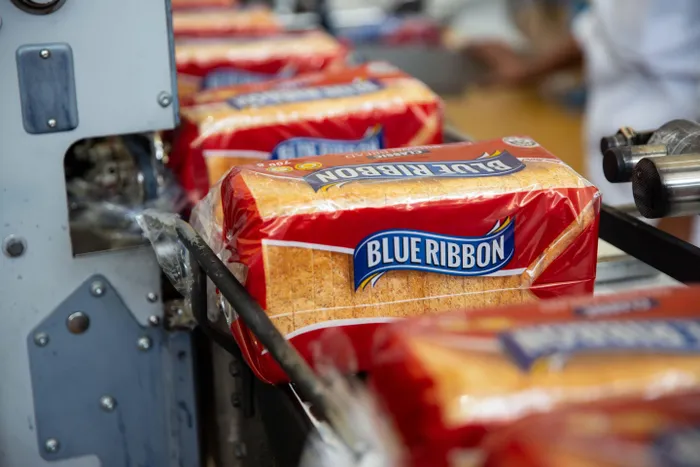
Premier Group's Blue Ribbon bread production line. The group recently announced plans to acquire RFG Holdings which will make Premier the second biggest food producer on the JSE.,
Image: Supplied
The share price of Premier Group surged 7.5% on Tuesday after it reported strong half-year earnings and outlined the path ahead with the acquisition of food maker RFG Holdings.
The fast-moving consumer goods company behind brands such as Blue Ribbon, Snowflake, and Iwisa reported revenue up 6.4% to R10.3 billion in the six months to September 30. The share traded at R171.71 cents on the JSE on Tuesday morning, bringing the price growth to an equally robust 51.9% this year.
A once-off cash dividend of 159 cents a share was declared - the final dividend will be adjusted downwards to maintain the group 30% of diluted HEPS payout ratio. Headline earnings a share increased 27.9% to 560 cents. Earnings before interest, tax, depreciation, and amortisation (EBITDA) was up 13.6% to R1.3bn.
“This is a transformational transaction for Premier. RFG’s complementary portfolio and strong customer relationships align perfectly with our strategy to build a diversified, best-in-class food and consumer-goods business. Together we’ll have greater scale, stronger brand presence, and an exciting platform for sustainable growth,” CEO Kobus Gertenbach said.
The group surprised the local food manufacturing sector when it announced on October 16, 2025, that it intends to acquire RFG, one of South Africa’s leading producers of convenience meals and long-life food products, with strong market positions in canned fruit, beverages, and ready meals under brands such as Rhodes Quality, Hinds, and Bull Brand.
The deal is being done through a share-swap arrangement that will see RFG shareholders own about 22.5% of the enlarged Premier Group.
Once completed, the deal adds some R8bn in annual revenue and R1.1bn in EBITDA, positioning Premier as the second-largest food producer listed on the JSE, with combined annual revenue above R29 billion. Tiger Brands is the largest food maker on the JSE.
The move will also lift Premier’s free float on the JSE from 33% to around 40%, improving liquidity and broadening access for institutional investors.
Premier’s steady expansion has seen it triple its market capitalisation since listing on the JSE three years ago, rising to R19.6bn at September 30, 2025.
“Our growth since listing reflects the strength of our brands, our focus on efficiency, and the disciplined execution of strategy. We’ve shown an ability to grow value even in a tough consumer and commodity environment,” said Gertenbach.
In the six-months, the Millbake division, which generates about 83% of group revenue, increased by 6% to R8.6bn, and EBITDA was raised by 12.4% to R1.3bn. Demand for Blue Ribbon and Snowflake products remained robust, supported by improved service delivery and cost management, he said.
Construction of the Aeroton mega-bakery, one of Premier’s largest infrastructure projects, was progressing well, with phase 1 commissioning scheduled for this month and phase 2 for February 2026.
The Groceries and International divisions' revenue added 8.1% to R1.8bn, and EBITDA was up 13.8% to R119m. Sugar confectionery volumes rose from improved service levels, new business contracts, and the ramp-up of the liquorice line.
The Home and Personal Care business benefitted from new tampon and liner machinery, while operations in the UK were supported by Lil-Lets product innovation and expanding export channels, including through Amazon, now the brand’s largest single retail platform.
Notwithstanding macro-economic headwinds in Mozambique, the CIM business experienced an uptick in trading conditions, producing pleasing results.
Premier’s balance sheet continues to strengthen. Cash generated from operations rose 34.7% to R1.3bn, reflecting EBITDA growth and tighter working-capital control.
Voluntary debt repayments of R70m were made, with R1.4bn in undrawn revolving credit facilities still available to fund future growth.
Premier invested R510m in capital projects during the half-year, including R147m in prepaid capex.
“We’ve maintained a disciplined approach to capital allocation, ensuring our balance sheet supports growth while rewarding shareholders through dividends and buybacks,” said Gertenbach.
A share-repurchase programme was planned to buy back shares at up to R154 per share, the same price used in the RFG transaction. The aim was to optimise the group capital structure.
Gertenbach said they expect to maintain their growth trajectory into the second half, supported by new capacity coming online and efficiency gains from recent investments. Completion of the RFG transaction, anticipated before financial year-end, was expected to unlock further benefits.
Visit:www.businessreport.co.za